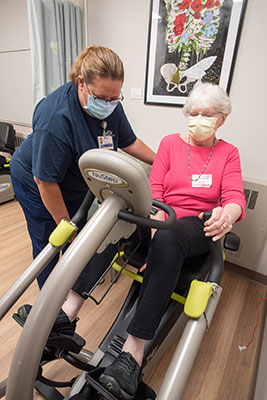Gribble family invests in exercise space for transplant patients
 Elizabeth and Ken Gribble own a cottage near the Au Sable River in northern Michigan that they consider their refuge. For years, the Ford Motor Company retirees have retreated to the woods in their free time, where Elizabeth enjoys long walks and Ken spends the evenings fly fishing.
Elizabeth and Ken Gribble own a cottage near the Au Sable River in northern Michigan that they consider their refuge. For years, the Ford Motor Company retirees have retreated to the woods in their free time, where Elizabeth enjoys long walks and Ken spends the evenings fly fishing.
In April 2016, as they were visiting the cottage for the opening of the fly-fishing season, Elizabeth started to notice that some fatigue she was feeling may be something much worse.
“On that trip, it really hit Liz that she had something going on,” Ken said. “A month later, she was bedridden.”
A series of visits to the doctor revealed that Elizabeth was suffering from pulmonary fibrosis, a condition that led to the deterioration of her lungs, along with a blockage near her heart.
The Gribbles found their way to the Henry Ford Transplant, and Elizabeth was added to the transplant list. One week later, a pair of donor lungs became available and she underwent a bilateral, double-lung transplant procedure, along with a heart bypass.
“The care I received at Henry Ford was wonderful,” Elizabeth said. “I can’t remember the names of everybody who cared for me, but I remember all their faces. I really appreciated the doctors and nurses who would explain things to me.”
Her recovery was long and complicated, with many twists and turns. Under the direction of her physicians, Lisa Allenspach, M.D. and Lisa Stagner, D.O. — and with support from a team of nurses, physical therapists and rehab specialists — Elizabeth has regained much of her strength, independence and mobility, thanks to many hours of exercise along the way.
As an expression of their gratitude, in 2019 Elizabeth and Ken made a generous contribution to help create a lung transplant rehab room at Henry Ford Hospital.
“Before my transplant, I was never one to exercise for the sake of exercise. I walked and gardened and chased around after two kids, but you wouldn’t find me in the gym. It is a bit ironic that our gift is going to support a rehab space,” Elizabeth said. “But I absolutely want for other patients to have the best possible care you can get, and exercise is such an important part of that. It’s our way of paying it forward to help others.”
The space that the Gribbles’ generosity helped fund contains a wide range of specialized exercise equipment. Our rehabilitation teams will use this resource to help patients recover after transplant procedures, as well as prepare for operations with “prehab” therapy, which is shown to produce major benefits for patients’ long-term outcomes.
In June, Ken and Elizabeth visited the studio in person for a small ribbon-cutting ceremony, along with Dr. Allenspach and Marwan Abouljoud, M.D., director of Henry Ford Transplant.
Today, Elizabeth is back to enjoying an active life: she was thrilled earlier this year after climbing the steep hill leading to her cottage on her own for the first time since her transplant. She also spends as much time as possible with her two children and three grandchildren, who she calls the best medicine in the world.
During a recent conversation, Elizabeth shared a story of spotting an Indigo Bunting — a brilliant blue migratory bird — visiting the feeder that Ken set up outside the cottage window. It was the first one she’s seen.
“She sees all these things now that she came so close to never seeing,” Ken reflected.
Elizabeth concluded his thought: “And I appreciate every single one of them.”
.svg?iar=0&hash=F6049510E33E4E6D8196C26CCC0A64A4)

/hfh-logo-main--white.svg?iar=0&hash=ED491CBFADFB7670FAE94559C98D7798)